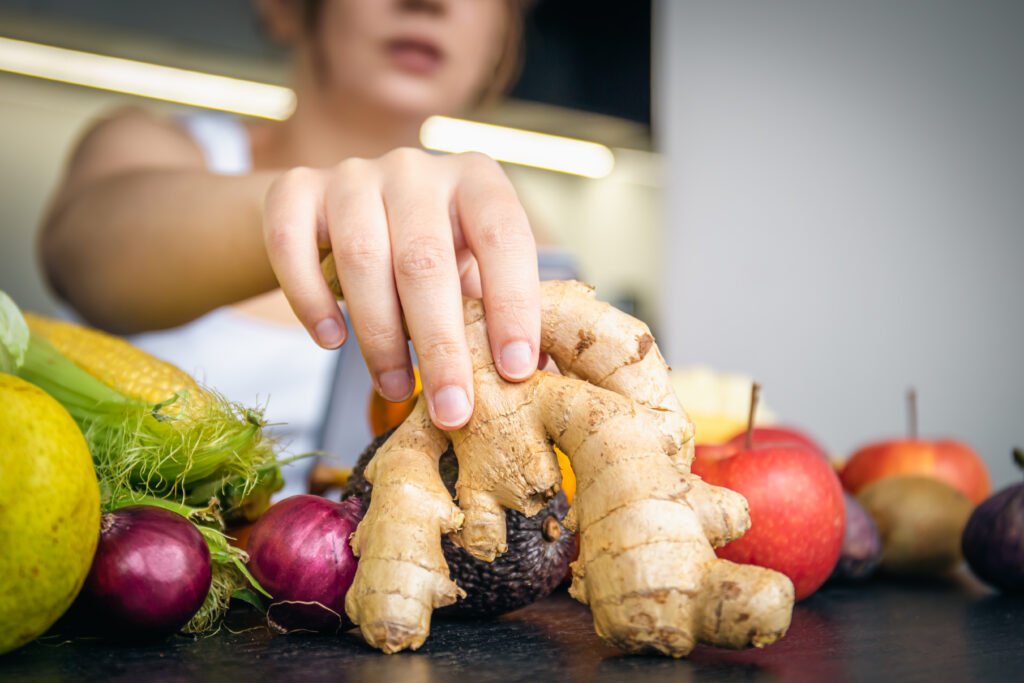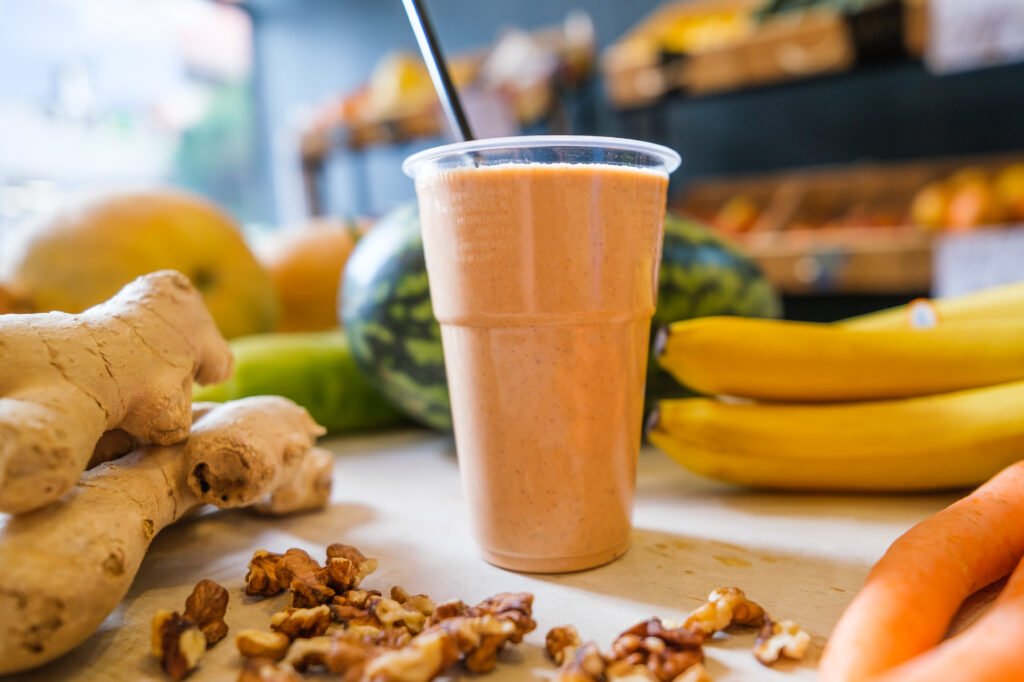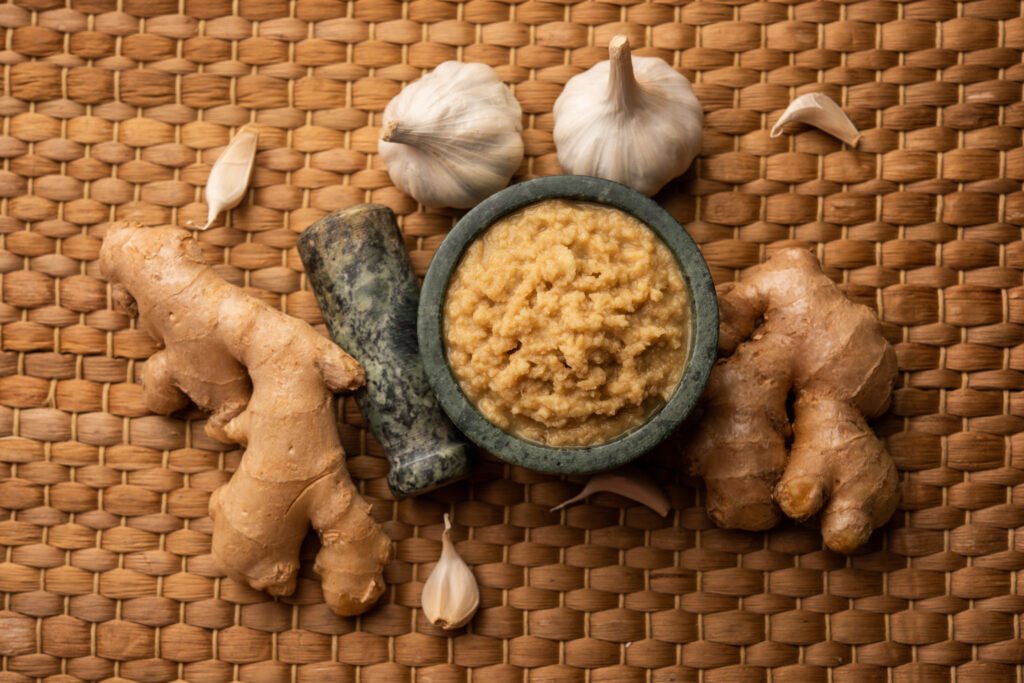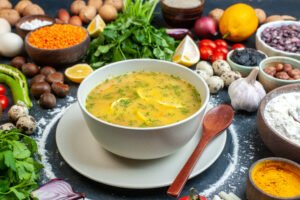
Gastritis can bring discomfort and disrupt daily life. And, while medications are often prescribed to alleviate symptoms, natural remedies like ginger offer a holistic approach to managing gastritis.
Ginger, a versatile spice renowned for its culinary and medicinal properties, has long been valued for its ability to soothe digestive issues.
In this article, we’ll explore 12 benefits of ginger for gastritis and provide insights into incorporating it into your diet, including supplements and recipes.
- Anti-Inflammatory Properties
Ginger contains bioactive compounds like gingerol and shogaol, which possess potent anti-inflammatory properties. These compounds help reduce inflammation in the stomach lining, providing relief from gastritis symptoms.
- Alleviates Nausea
One of ginger’s most well-known benefits is its ability to alleviate nausea. Whether caused by gastritis or other factors like motion sickness or pregnancy, ginger can help calm the stomach and reduce feelings of queasiness.
- Stimulates Digestive Enzymes
Ginger stimulates the production of digestive enzymes, which aid in the breakdown and absorption of nutrients.
By enhancing digestive function, ginger can help ease symptoms of gastritis and promote overall gut health.
- Relieves Indigestion
Indigestion, characterized by discomfort and bloating after eating, is a common symptom of gastritis. Ginger’s digestive properties can help alleviate indigestion by promoting the efficient digestion of food.

- Protects Gastric Mucosa
The mucous membrane lining the stomach, known as the gastric mucosa, is susceptible to damage from factors like stomach acid and inflammation. Ginger helps protect the gastric mucosa from such damage, reducing the risk of gastritis flare-ups.
- Antibacterial Effects
Ginger exhibits antibacterial properties that can help combat H. pylori bacteria, a common cause of gastritis. By inhibiting the growth of these harmful bacteria, ginger contributes to the management of gastritis symptoms.
- Supports Gut Motility
Ginger supports healthy gut motility, ensuring that food moves smoothly through the digestive tract. This can prevent the stagnation of food in the stomach, which can exacerbate gastritis symptoms like bloating and discomfort.
- Reduces Gas and Bloating
Excessive gas and bloating are common complaints among individuals with gastritis. Ginger’s carminative properties help expel gas from the digestive system, reducing bloating and discomfort.
- Soothes Stomach Irritation
Ginger’s soothing properties help calm stomach irritation and inflammation, providing relief from gastritis symptoms like pain and discomfort.

- Enhances Blood Circulation
Improved blood circulation is essential for maintaining a healthy stomach lining. Ginger promotes circulation throughout the body, ensuring that essential nutrients reach the stomach lining to support healing and repair.
- Balances Acidity
Ginger helps balance stomach acidity by neutralizing excess stomach acid and promoting a healthy pH balance. This can alleviate symptoms of acid reflux and heartburn associated with gastritis.
- Supports Overall Digestive Health
By addressing various digestive issues, ginger supports overall digestive health and reduces the likelihood of gastritis flare-ups. Its gentle yet effective action makes it a valuable addition to any gastritis management plan.
How to Take Ginger as a Supplement
- Ginger Capsules
Ginger supplements are available in capsule form, providing a convenient way to incorporate ginger into your daily routine. Follow the recommended dosage on the product label for optimal results.
- Ginger Tea
Brewing a cup of ginger tea is a soothing way to reap the benefits of ginger. Simply steep fresh ginger slices or ginger tea bags in hot water for 5-10 minutes, then strain and enjoy. Add honey or lemon for added flavor.
- Ginger Extract
Liquid ginger extract can be added to water or juice for a concentrated dose of ginger goodness. Start with a small amount and gradually increase as needed.

Gastritis-Friendly Ginger Recipes
Recipe #1: Ginger Lemon Water
Ingredients:
- 1-inch piece of fresh ginger, peeled and thinly sliced
- 1 lemon, juiced
- 1 tablespoon honey (optional)
- 4 cups water
- Ice cubes (optional)
Instructions:
- In a pitcher, combine the sliced ginger, lemon juice, honey (if using), and water.
- Stir well to mix the ingredients thoroughly.
- Chill the ginger lemon water in the refrigerator for at least 30 minutes to allow the flavors to infuse.
- Serve the ginger lemon water over ice cubes if desired, and enjoy this refreshing drink throughout the day.
Recipe #2:Ginger Turmeric Tea
Ingredients:
- 1-inch piece of fresh ginger, peeled and grated
- 1 teaspoon ground turmeric
- 2 cups water
- Honey to taste (optional)
Instructions:
- In a small saucepan, bring the water to a boil.
- Add the grated ginger and ground turmeric to the boiling water.
- Reduce the heat to low and simmer the mixture for 5-10 minutes, allowing the flavors to meld.
- Strain the ginger turmeric tea into cups.
- Add honey to taste if desired, and sip on this soothing tea to ease gastritis symptoms.
Recipe #3:Ginger Banana Smoothie
Ingredients:
- 1-inch piece of fresh ginger, peeled and chopped
- 1 ripe banana
- 1 cup spinach leaves
- 1 cup almond milk (or any milk of your choice)
- 1 tablespoon honey (optional)
- Ice cubes (optional)
Instructions:
In a blender, combine the chopped ginger, banana, spinach leaves, almond milk, and honey (if using).
Blend until smooth and creamy.
If desired, add ice cubes to the blender and blend again until the smoothie reaches your desired consistency.
Pour the ginger banana smoothie into glasses and enjoy as a nutritious breakfast or snack.

Recipe #4:Ginger Garlic Soup
Ingredients:
- 2-inch piece of fresh ginger, peeled and thinly sliced
- 4 cloves garlic, minced
- 4 cups chicken or vegetable broth
- 1 tablespoon olive oil
- Salt and pepper to taste
- Chopped fresh parsley for garnish (optional)
Instructions:
- In a large pot, heat the olive oil over medium heat.
- Add the sliced ginger and minced garlic to the pot and sauté for 2-3 minutes until fragrant.
- Pour in the chicken or vegetable broth and bring the soup to a simmer.
- Let the soup simmer for 15-20 minutes to allow the flavors to develop.
- Season the soup with salt and pepper to taste.
- Ladle the ginger garlic soup into bowls, garnish with chopped fresh parsley if desired, and serve piping hot.
Recipe #5:Ginger Chicken Stir-Fry
Ingredients:
- 1 lb chicken breast, thinly sliced
- 2-inch piece of fresh ginger, peeled and minced
- 3 cloves garlic, minced
- 1 bell pepper, sliced
- 1 cup broccoli florets
- 2 tablespoons soy sauce
- 1 tablespoon sesame oil
- Cooked rice for serving
Instructions:
- Heat the sesame oil in a large skillet or wok over medium-high heat.
- Add the minced ginger and garlic to the skillet and stir-fry for 1-2 minutes until fragrant.
- Add the sliced chicken breast to the skillet and cook until browned and cooked through.
- Stir in the sliced bell pepper and broccoli florets and cook for an additional 3-4 minutes until the vegetables are tender-crisp.
- Drizzle the soy sauce over the chicken and vegetables, and toss to coat evenly.
- Serve the ginger chicken stir-fry over cooked rice and enjoy this flavorful and satisfying dish.
Recipe #6: Ginger Carrot Soup
Ingredients:
- 2 tablespoons olive oil
- 2-inch piece of fresh ginger, peeled and minced
- 1 onion, chopped
- 4 cups chopped carrots
- 4 cups vegetable broth
- Salt and pepper to taste
- Coconut cream for garnish (optional)
- Chopped fresh cilantro for garnish (optional)
Instructions:
- In a large pot, heat the olive oil over medium heat.
- Add the minced ginger and chopped onion to the pot and sauté until the onion is soft and translucent.
- Stir in the chopped carrots and vegetable broth, and bring the soup to a boil.
- Reduce the heat to low and simmer the soup for 20-25 minutes, or until the carrots are tender.
- Use an immersion blender or countertop blender to puree the soup until smooth.
- Season the ginger carrot soup with salt and pepper to taste.
- Ladle the soup into bowls, garnish with a swirl of coconut cream and chopped fresh cilantro if desired, and serve hot.
Recipe #7:Ginger Turmeric Rice
Ingredients:
- 1 cup white or brown rice
- 2 cups water
- 1-inch piece of fresh ginger, peeled and grated
- 1 teaspoon ground turmeric
- Salt to taste
- Chopped fresh parsley for garnish (optional)
Instructions:
- Rinse the rice under cold water until the water runs clear.
- In a medium saucepan, combine the rinsed rice, water, grated ginger, ground turmeric, and salt.
- Bring the rice mixture to a boil over high heat.
- Reduce the heat to low, cover the saucepan, and simmer the rice for 15-20 minutes, or until the liquid is absorbed and the rice is tender.
- Fluff the ginger turmeric rice with a fork, transfer it to a serving dish, and garnish with chopped fresh parsley if desired.
- Serve the rice as a flavorful side dish to accompany your favorite protein or vegetable dishes.
Conclusion
Ginger offers a multitude of benefits for individuals dealing with gastritis, ranging from anti-inflammatory and digestive properties to antibacterial effects and beyond.
Whether consumed fresh, as a supplement, or incorporated into recipes, ginger can play a valuable role in managing gastritis symptoms and promoting digestive wellness.
By embracing the power of ginger, individuals with gastritis can take proactive steps towards better digestive health and overall well-being.












